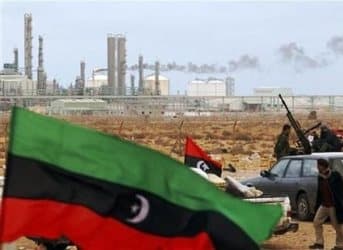Oil prices are at a six-month high and no one knows exactly what is going to happen in Syria nor how it will ultimately affect oil prices in the coming weeks. However, in addition to fear, the recent spike in oil prices also reflects more fundamental supply factors: Libya, a major regional producer, has seen its production completely collapse over the past month.

Libya’s crude oil is of extremely high quality and is a favourite feedstock for European refineries. The loss in Libyan production has put increased strain on an already tight global oil market—OPEC’s spare capacity stands at a low 2.31 million barrels per day, or a mere 2.5% of global consumption—which serves to increase the fear that any mistake in Syria could cause an oil shortage.
Related article: Saudi Prince Bandar Schemes in Syria
Yesterday, Tarek Didaa, the head of the Libyan Ministry of Oil’s press office, told the Libya Herald that oil exports now stand at an anaemic 160,000 barrels per day. Production has fallen almost 90% from 1.6 million barrels per day only a few months ago, levels not seen since the 2011 civil war that ousted long-time strong man Muammar Gaddafi.
While production bottomed out during the war, the majority of the oil infrastructure remained undamaged and the transitional government was able to quickly ramp up production to near pre-war levels. Libya had been producing between 1.4 and 1.6 million barrels per day for most of 2012 and through the first quarter of 2013.
The trouble began when a series of labour strikes began spreading through Libya’s oil fields and export terminals. The strikes started as a call for higher wages and better working conditions by members of the Petroleum Facilities Guard—the armed force tasked with defending the country’s oil infrastructure. However, targeting Libya’s oil assets is now the tactic-of-choice of any and all who want to voice a grievance or simply make a play for cash and power.
“Militia groups are behaving like terrorists, using control over oil as political leverage to extract concessions,” said Dr. Elizabeth Stephens, head of political risk at Jardine Lloyd Thompson. The central government is attempting to regain control of its oil assets but Tripoli’s power in the East is tenuous at best. "Practically the government is dead, technically it is still there," said Noman Benotman, president of the counter-terrorism think-tank Quilliam.
Related article: Syria Barely a Blip on International Oil Market
This precipitous decline in oil production is especially dire for Libya, where petroleum exports accounted for over three-quarters of GDP last year. The recent shutdowns have cost the central government over $2 billion and have hurt its previously healthy fiscal position. The trickle of oil still making it out for export is coming through the last two functioning terminals, Zawia and Al-Hariga but, with the current security as it is, only time will tell how much longer these remain operational.
Lacking any security guarantees, investment in Libya’s oil industry has completely disappeared and international firms are simply trying to limit their losses as they pull out. The Swiss-based group Petromatrix stated that “we are currently witnessing the collapse of state in Libya, and the country is getting closer to local wars for oil revenues.”
ADVERTISEMENT
If this continues, it is hard to see how we can avoid what Abdelbari al-Arusi, Libya’s oil minister, called Libya’s “plunge into darkness.”
By. Rory Johnston



















Rory Johnston i really think u have no idea about whats really happening in Libya us the Libyan people in east Libya been suffering over 45 years . why u call us “Militia groups and behaving like terrorists , when the poor people of Libya asked for investigations on corruption inside the oil minstery , sir i think u should find out the real truth before you right something that the whole world will read .. u are not covering the story on the ground u just writing an articular from story's you hear on line ..